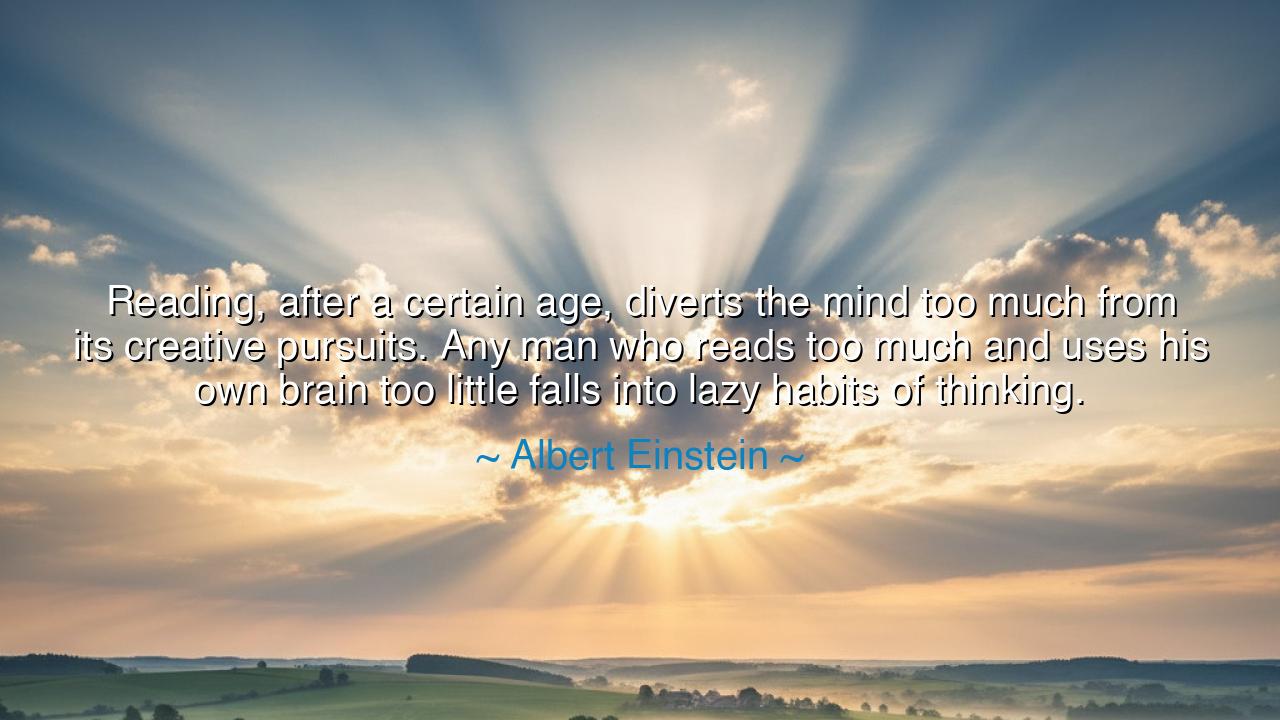
Reading, after a certain age, diverts the mind too much from its
Reading, after a certain age, diverts the mind too much from its creative pursuits. Any man who reads too much and uses his own brain too little falls into lazy habits of thinking.






The great Albert Einstein, whose mind touched the very fabric of creation, once declared: “Reading, after a certain age, diverts the mind too much from its creative pursuits. Any man who reads too much and uses his own brain too little falls into lazy habits of thinking.” These words, coming from one of the most brilliant thinkers in human history, strike like a bell at dawn. They awaken us to the truth that knowledge without imagination is hollow, and that wisdom grows not merely from consuming the thoughts of others, but from daring to create one’s own.
Einstein spoke these words as both a scientist and a philosopher of life. His mind was nourished by books, yet he understood their danger: that one could drown in the thoughts of others and forget to swim in the deep waters of one’s own ideas. In an age where libraries were treasures and books the pride of scholars, he dared to say that too much reading can dull the edge of invention. He did not mean that reading is evil — far from it. Rather, he warned that the mind, if it becomes merely a collector of facts, loses the fire of curiosity. To learn endlessly but never to think freely is to feed the body and starve the soul.
The origin of this insight can be traced to Einstein’s own youth. As a boy, he read voraciously, yet he also rebelled against rote learning. His teachers accused him of being slow, for he refused to memorize what he could reason through. When others followed rules, he followed questions. It was this inner defiance — the refusal to let others do his thinking — that led him to challenge the great Isaac Newton and uncover the hidden law of relativity. He became the living proof that creativity is not born from obedience, but from wonder.
History offers many such examples. Consider Leonardo da Vinci, whose genius spanned art, science, and invention. He read, yes, but sparingly — and he observed endlessly. He studied the motion of birds to design his flying machines, watched the flow of rivers to understand anatomy. His library was the living world, his laboratory the landscape of thought. Had he confined himself to the writings of others, his imagination might have remained caged. But because he used his own mind as his greatest book, he painted the eternal mystery of the Mona Lisa and drew the blueprints for the future.
Einstein’s warning resounds more powerfully in our own age, when information overflows like a flood. We read endlessly — articles, screens, opinions — but seldom pause to think, digest, or create. The danger he foresaw has become the modern illness: a restless consumption of ideas without contemplation. The mind, once a forge for new fire, risks becoming a warehouse of borrowed sparks. Yet the remedy remains the same as in his time: to balance learning with reflection, to let silence ripen knowledge into understanding.
The lesson of his words is both humbling and empowering. Reading is the foundation, but imagination is the cathedral. A wise reader must not worship the printed word, but wrestle with it, question it, and rise beyond it. For what is genius if not the courage to walk beyond the map drawn by others? Those who think for themselves may stumble, but in their stumbling they find new paths. Those who only follow never truly arrive anywhere at all.
Therefore, O seeker of wisdom, read — but do not be ruled by what you read. After every page, close the book and ask your mind what it believes. Dream, invent, observe, and doubt. Let what you read be the spark, not the flame. Fill your mind, but more importantly, use it. For the greatest library in the world is worthless if its keeper never opens his own eyes to the stars.
Thus remember, as Einstein did: the purpose of learning is not to gather dust on the shelves of memory, but to awaken the living light of creation. Read to understand — and then think to transform. For it is not the quantity of knowledge that defines a great mind, but the quality of thought that springs from it.






AAdministratorAdministrator
Welcome, honored guests. Please leave a comment, we will respond soon